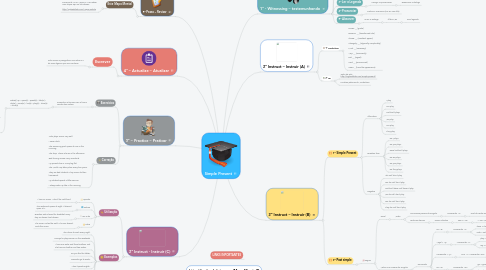
1. http://inglesdefato.com/
2. 5º Passo – Revisar
2.1. Este Mapa Mental
2.1.1. Periodicamente - Utilizar as técnicas da Ferramenta MAPA MENTAL. Para saber mais clique aqui no link abaixo: http://inglesdefato.com/MapaMentalR
3. 4º – Actualize – Atualizar
3.1. Escrever
3.1.1. Pelo menos 3 parágrafos a sua rotina e a de mais alguém que você conhece.
4. 3º – Practice – Praticar
4.1. Exercícios
4.1.1. Preencher as lacunas com a forma correta dos verbos:
4.1.1.1. wake(s) up – open(s) – speak(s) – take(s) – do(es) – cause(s) – live(s) – play(s) – close(s) – drink(s)
4.1.1.1.1. John _____________ soccer very well. I never _____________ milk. The swimming pool _____________ at 9:00 in the morning. The shop _____________ at 5:00 in the afternoon. Bad driving _____________ many accidents. My parents _____________ in a very big flat. The World Cup ____________ place every four years. They are bad students. They never _____________ their homework. My students _____________ a little German. I always _____________ late in the morning.
4.2. Correção
4.2.1. John plays soccer very well. I never drink The swimming pool opens at 9:00 in the morning. The shop closes at 5:00 in the afternoon. Bad driving causes many accidents. My parents live in a very big flat. The World Cup takes place every four years. They are bad students. They never do their homework. My students speak a little German. I always wake up late in the morning.
5. 2º Instruct - Instruir (C)
5.1. Utilização
5.1.1. Opinião
5.1.1.1. I love ice cream. I don’t like cold food.
5.1.2. Rotinas
5.1.2.1. The restaurant opens at eight. It doesn’t open at 7.
5.1.3. Dia a dia
5.1.3.1. Brandon eats a bread for breakfast every day. He doesn’t eat cheese.
5.1.4. Fatos
5.1.4.1. The moon circles the earth. The sun doesn’t circle the moon.
5.2. Exemplos
5.2.1. She drives to work every night.
5.2.2. He says he plays soccer on the weekends
5.2.3. I have one sister and three brothers. But she has one brother and two sisters.
5.2.4. Do you like the table?
5.2.5. Does she go to work?
5.2.6. I don’t speak English.
5.2.7. My sister meets his boyfriend everyday.
5.2.8. John is a bus driver. He drives a bus. But on Sundays he doesn’t drive his bus. He stays at home.
6. LINKS INPORTANTES
7. http://inglesdefato.com/MapaMentalR
8. http://inglesdefato.com/simple-present/
9. 1º - Witnessing – testemunhando
9.1. 1º Ouvir
9.1.1. Tocar o Vídeo
9.1.1.1. Sem Legenda
9.1.1.1.1. Diversas Vezes
9.2. 2º Escrever
9.2.1. Palavras Entendida
9.2.1.1. Não se preocupar com:
9.2.1.1.1. Escrever Corretamente
9.2.1.1.2. Entender 100%
9.3. 3º Ler a Legenda
9.3.1. Corrigir o que escreveu
9.3.1.1. Reescrever o diálogo
9.4. 4º Pronunciar
9.4.1. Praticar a Pronúncia (Ler em voz alta)
9.5. 5º Absorver
9.5.1. Ouvir o Diálogo
9.5.1.1. Última Vez
9.5.1.1.1. Sem legenda
10. 2º Instruct – Instruir (A)
10.1. 1º Vocabulário
10.1.1. Drives: __________ (guide) Became: __________ (transformed into) Shows: ________ (manifest, appea) Strangely: ________ (atypically, inexplicably) Must: ________ (necessary) Very: ________ (immensely) Eat: ________ (ingest) Said: ________ (pronounced) Seem: _________ (have the appearance)
10.2. 2º Ler
10.2.1. Texto da aula http://inglesdefato.com/simple-present/
10.2.2. Localizar palavras do Vocabulário
11. 2º Instruct – Instruir (B)
11.1. 1º Simple Present
11.1.1. Affirmative
11.1.1.1. I play
11.1.1.2. You play
11.1.1.3. He/She/It plays
11.1.1.4. We play
11.1.1.5. You play
11.1.1.6. They play
11.1.2. Question form
11.1.2.1. Do I play?
11.1.2.2. Do you play?
11.1.2.3. Does he/she/it play?
11.1.2.4. Do we play?
11.1.2.5. Do you play?
11.1.2.6. Do they play?
11.1.3. Negative
11.1.3.1. I do not/ don't play
11.1.3.2. You do not/ don't play
11.1.3.3. He/She/It does not/ doesn't play
11.1.3.4. We do not/ don't play
11.1.3.5. You do not/ don't play
11.1.3.6. They do not/ don't play
11.2. 2º Past simple
11.2.1. Regras
11.2.1.1. Geral
11.2.1.1.1. Verbo
11.2.1.2. Verbo na 3ª Pessoa do Singular
11.2.1.2.1. Terminado
11.2.1.2.2. Have

